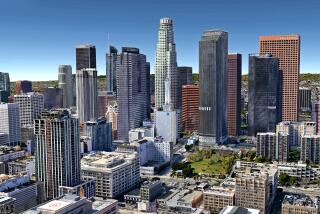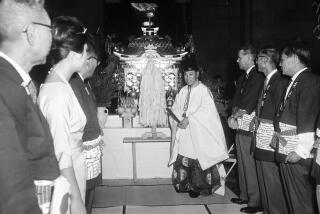South Korean firm aims for the sky in L.A.
Ambitious South Korean enterprises continue to make noise on the global economic stage.
Electronics giant Samsung is giving Apple fits in markets across the globe with its hot-selling smartphones and tablets. Seoul-based Hyundai and Kia have been among the world’s fastest-growing automakers in recent years. Portly singer Psy put South Korea on the pop culture map with his monster hit “Gangnam Style,” which has become the most popular video of all time on YouTube with nearly 1.3 billion views.
So it was only natural that South Korea’s top airline, Korean Air, on Thursday took the wraps off its design for a dramatic, skyline-changing tower for downtown Los Angeles. The $1-billion skyscraper is to become the tallest building west of the Mississippi River — and a symbol of South Korea’s status as an up-and-coming economic powerhouse.
The 73-story hotel and office building will include 900 guest rooms, double-decker elevators and an observation deck that will afford views of the Pacific Ocean. Slated to replace the old Wilshire Grand Hotel at Wilshire Boulevard at Figueroa Street, the new building will be slightly taller than the nearby U.S. Bank Tower, which has held the title of tallest building west of Chicago since 1989.
Originally planned as two smaller towers when it was announced four years ago, the Korean Air plan has morphed into a single tower that will give the Seoul company bragging rights to the highest skyscraper on the West Coast.
Experts said that’s in keeping with South Korea’s hard-charging business ethos. The skyscraper, currently dubbed the Wilshire Grand, is an outgrowth of a competitive corporate culture that has come to dominate the South Korean economy over the last 30 years, according to UC Riverside Ethnic Studies professor Edward Taehan Chang.
After the nation endured poverty, dictatorship and political unrest during much of the 20th century, attaining superlatives has become part of the country’s fabric, Chang said. Corporations strive to dominate their industries, while younger generations take pride in the near universality of South Korea’s popular culture.
“They always want to reach for No. 1 status,” Chang said. “The rapid economic growth has been about striving for the top spot.”
Korean Air is already at work dismantling the closed 1950s-era Wilshire Grand Hotel to make way for the glass-clad tower, which is expected to be completed in 2017. Korean Air has provided airline service to Los Angeles for more than 40 years and has owned the Wilshire Grand since 1989.
Korean Air is the flagship company of Hanjin Group, one of South Korea’s largest conglomerates. Hanjin has interests in land, sea and air transportation as well as construction, heavy industry, finance and information services. A high-end hotel fits well with Korean Air’s operations in Los Angeles: The company makes parts for airplanes, flies the planes here as the busiest Asian carrier at Los Angeles International Airport, runs travel agencies that book the tickets and operates a catering business that serves the food on the planes.
“The new Wilshire Grand is an investment that makes sense, and we are excited to continue our relationship with this great city,” Korean Air Chairman Y.H. Cho said Thursday at the offices of AC Martin Partners, the project’s architect.
The sail-shaped skyscraper will light up at night and dwarf many of its neighbors. Most of the building will be devoted to a hotel, though an operator has yet to be named. Arriving guests would be whisked by high-speed elevators to the “sky lobby” on the 70th floor for check-in.
According to the plan, the 71st floor will be a restaurant. The floor above that will house window-washing gear and engineering equipment, clearing the top floor for an infinity swimming pool and observation deck.
Near street level will be about three floors of restaurants and shops, topped by 30 floors of offices for rent. Elevators will be double-decked, carrying two stacked cabs of passengers for additional capacity during peak hours.
Perched at the very top of the building will be a decorative “crown” and a mast-like spire that will have embedded LED lighting that can change colors. The display will be eye-catching and visible for miles, but it will not be used for advertising, said Christopher Martin, chief executive of AC Martin.
“It’s not Coke bottles, it’s art,” he said.
With the spire reaching to 1,100 feet, the Wilshire Grand would become one of the tallest structures in the country, surpassing the 1,046-foot Chrysler Building in New York, which has 77 stories.
The contemporary design of the Wilshire Grand, with its floor-to-ceiling windows, is intended to set it apart from surrounding granite-clad office towers, said architect David Martin, who is Christopher Martin’s cousin.
He hopes the building, which is to include 400,000 square feet of office space, will reflect the city better than the last generation of skyscrapers does. The Wilshire Grand, for instance, will have operable windows in its guest rooms and offices.
“This is about the culture and climate of L.A.,” Martin said. “We are creating a sense of place, only it’s 1,000 feet up in the air.”
AC Martin also designed the Figueroa-at-Wilshire high-rise across the street from the Wilshire Grand in 1990. The family firm was the primary architect of Los Angles City Hall in the 1920s.
Work on the new skyscraper will create 11,000 union construction jobs, Korean Air’s Cho said, and employ 1,700 workers when it opens in four years. The project has obtained most development approvals from L.A. city officials.
Cho, who lives in Seoul and has a home in Newport Beach, is on the board of trustees at USC, where his children attended college and where he obtained his MBA.
“L.A. is like a second home,” Cho said.
The 936-room Wilshire Grand, built in 1952, was originally a Hotel Statler and later a Hilton. Once one of the city’s best hotels, it was most recently a mid-market inn catering to conventioneers and tour groups from overseas before it closed at the end of 2011.
The property is a few blocks north of Staples Center.
Times staff writer Frank Shyong contributed to this story.
More to Read
Inside the business of entertainment
The Wide Shot brings you news, analysis and insights on everything from streaming wars to production — and what it all means for the future.
You may occasionally receive promotional content from the Los Angeles Times.











